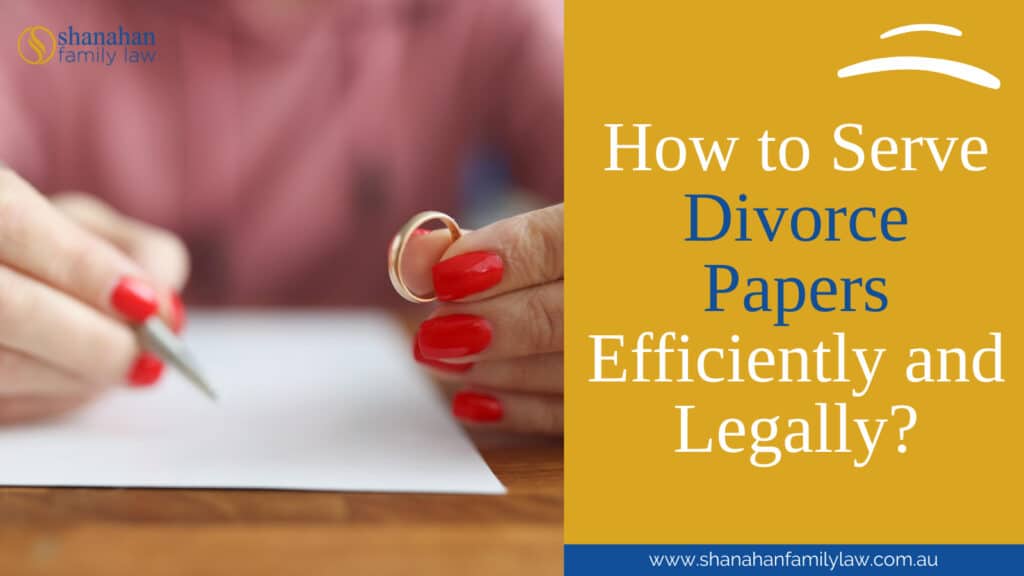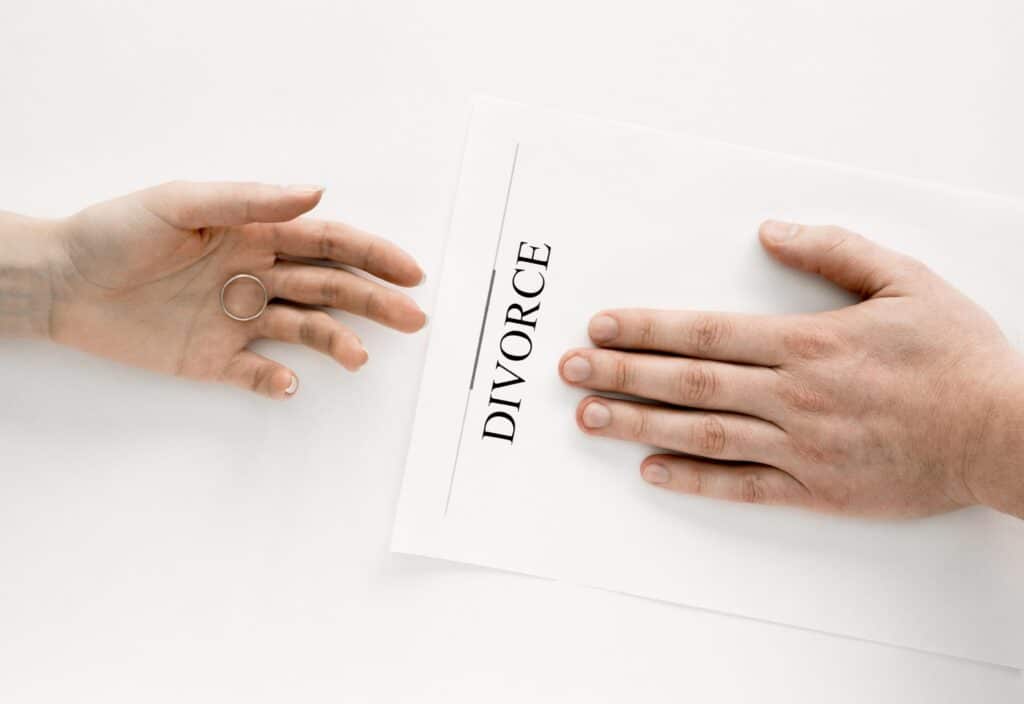
There are many steps to complete when applying for a divorce. One of the first steps in a sole application for divorce is serving divorce papers on your spouse. In this article, we’ll discuss what’s involved at this stage.
- When do you serve divorce documents?
- What documents do you serve?
- How do you serve court documents?
- Is there a time limit?
- What if you can’t locate your spouse?
- What happens after you serve divorce papers?
We’ll answer all these questions so you are equipped with the knowledge to finalise your divorce as soon as possible.
If you want to make your divorce process easier, we can help!
Download our FREE All In One Divorce Checklist for a more detailed guide on the next steps.
When do you serve divorce documents?
You can finalise a divorce through a joint or sole application. If you and your spouse agree to apply for a divorce together, you don’t need to serve your spouse divorce papers. If you are applying for divorce alone, you must serve divorce documents and provide your spouse with the opportunity to respond.
What documents do you serve?
In addition to a court-sealed copy of the divorce application, there are three other documents you must serve:
A copy of the Court’s Marriage, Families and Separation brochure
This brochure provides information for people considering or affected by separation or divorce.
It includes information about the following:
- The social and legal effects of separation
- The services provided to families by the Federal Circuit and Family Court of Australia (the Court) and by government, community and other agencies, and
- Some of the steps involved in court proceedings.
A court-sealed copy of the Affidavit for eFiling
The Affidavit for eFiling (Divorce) forms part of the Application for Divorce and must be signed by the applicant for a divorce to proceed.
As a sole applicant, you are the only party required to sign the Affidavit for eFiling (Divorce). A Justice of the Peace or a Lawyer must witness the signature.
Acknowledgement of service form
This form is used to acknowledge that filed documents have been served.
If the Application for Divorce is served by hand, the server must ask the respondent to sign and date the Acknowledgment of Service (Divorce) at Part C.
If the Application for Divorce is served by post, the Applicant must ask the respondent to date/sign and return the Acknowledgment of Service (Divorce).
The server must attach the Acknowledgment of Service (Divorce) to the Affidavit of Service (by Hand or Post).

How do you serve court documents?
There are different ways to serve the divorce papers. Which is most appropriate depends on your circumstances.
Personally serve
Typically, the other party receives the papers from the server in person. Restrictions apply to serving personally. You cannot serve the divorce papers yourself. You must engage another person who is over 18. This person may be a family member or friend. You may also use a professional process server. These agents will serve documents on your behalf for a fee.
Serve by post
When you are confident your spouse will accept service and return the signed acknowledgement of service divorce, a postal service may be an option.
Post the documents to your spouse’s last known address with instructions to sign the acknowledgement of service and return it to you. Please include a stamped envelope with your address they can use to return the form. Instruct them to keep the divorce application.
Serving your spouse’s lawyer
A signed acknowledgement of service from your spouse’s lawyer is also acceptable. The family court won’t require other service forms if the form is completed correctly.
There are other unique circumstances where there are other special steps to take. These circumstances include when your spouse has a disability, is overseas, or is in prison.
Are there time limits?
If your spouse is in Australia, you must serve them at least 28 days before your divorce hearing date.
If your spouse is overseas, you must serve the documents at least 42 days before your court hearing date.
What if you can’t locate your spouse?
When you can’t locate your spouse or, for whatever reason, can’t complete service, you must apply for alternative conditions.
Substituted service
Substituted service in Australian divorce law refers to an alternative method of serving divorce papers when it is not possible or practical to serve the documents to the other party personally. Through substituted service, the Court authorises an alternative way of serving the divorce papers so the respondent is notified of the divorce proceedings.
In situations where personal service is impractical, such as when the respondent is avoiding service or their whereabouts are unknown, the applicant can apply to the Court to use a different method. The Court will consider the circumstances and, if satisfied, grant permission for an alternative service method.
Here are some common forms of substituted service in Australia:
- Email or fax: In certain situations, the Court may permit service by email or fax if it is demonstrated that the respondent regularly checks their email or has agreed to receive documents through electronic means.
- Service on a family member or close associate: If it can be shown that the respondent is likely to receive the documents through a family member, close friend, or business associate, the Court may allow service on that person.
- Publication in a newspaper: In exceptional circumstances, the Court may allow service by publishing a notice of the divorce application in a newspaper approved by the Court. This method is typically a last resort and requires specific permission from the Court.
Dispensation of service
The Court may waive the requirement to serve divorce papers altogether. The Court will only grant a dispensation of service in exceptional circumstances. Dispensation of service is reserved for cases where an applicant cannot contact their spouse. The Court only requires you to make reasonable attempts to serve the documents. You are not expected to undergo undue financial hardship in the process.

Supporting affidavit
When applying for substituted service or dispensation, you must detail your efforts to serve the documents personally. The affidavit may include details such as the following:
- When you last communicated with the respondent and what the circumstances were;
- The respondent’s last known address;
- Any enquiries you made to the respondent’s friends or family and their responses;
- What enquiries you made to the respondent’s last known employer, and what were the answers received;
- Explanations of why the respondent may be uncontactable;
- How costly the attempts to serve the documents have been and whether you’ve suffered financial hardship as a result;
- Information on existing child support or maintenance arrangements in place.
- Details regarding jointly owned bank accounts, property or businesses;
- If the respondent lives overseas, what country do they reside in and for how long? Do they intend to return to Australia?
- Any other information that may be pertinent to the application.
After you serve the documents
Once you complete the service, fill out an Affidavit of Service by hand or post, depending on your actions. An Affidavit of Service is unnecessary if you served your spouse’s lawyer.
When the server doesn’t know your spouse, the applicant must complete an Affidavit proving signature and attach an acknowledgement of service divorce. The service documents should then be filed online through the Commonwealth Courts portal.
Let’s work together
Serving court documents can seem like a lot to handle. If you’re unsure about any part of the process, the team at Shanahan Family Law is here to help. Contact us today for legal advice.
Are you interested in chatting more about serving divorce papers?
To understand more about serving divorce papers, visit this pdf download from the QLD Government’s publication portal. It breaks down the process even more.
If you need help with family law matters, contact us for a free discovery call.

